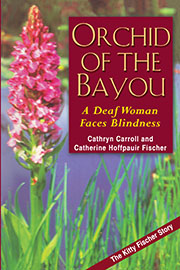A Deaf Woman Faces Blindness
The Kitty Fischer Story
Cathryn Carroll and
Catherine Hoffpauir Fischer
February 2001
|
View the table of contents. Read an excerpt. Read reviews: Publishers Weekly, DSQ, Silent News, Louisiana History. |
$29.95t print edition $29.95 e-book |
From Silent News
There is a lovely simile about three-quarters through this book. Kitty Fischer falls asleep on a train carrying her back to Louisiana after a semester at Gallaudet University. She dreams about her family catching crabs, when someone points to something over her head. She jumps away, imagining a poisonous snake...but no, it is a flower high up, attached and growing on a tree. It is an epiphyte, plants that live in trees - in this case, an orchid. Kitty awakens before she has a chance to tell her dream people what she was about to say: “Deaf people are like orchids...unable to establish roots the way most people do, deaf people bloom anyway.”
As a deaf reader, I was momentarily paralyzed by the clear truth and sheer beauty of this statement.
“Unable to establish roots” (in the ordinary ways of other plants, and as most people do, randomly) in the way she had only seen at the deaf school she attended and later at Gallaudet, Kitty notes that “Deaf people are like orchids in the swamp. There are lots of us around, but no one ever seems to know we are there.”
It is the beginning of her rediscovery of her roots, her Cajun history. Somewhere in her college years, Kitty becomes aware that she not only has no hearing or speech, but is also gradually becoming blind. She finds out she has Usher syndrome. The path ahead is clear: one day she will be blind. “That is just how it was.”
In Kitty’s working life after college - now married to her college sweetheart - she often told Carolyn Carroll, a coworker, stories about her Cajun life and how, for instance, her family had assumed she was retarded and how they brought in a faith healer. “Not my Uncle Frank...Mama hardly trusted him with a cold sore. She brought in Ethel, a healer and her own best friend.” After herbs and incantations and blessings, Kitty says, “I was as deaf as when she’d started.”
In the age-old way of becoming an adult, there is a period in which Kitty rejects her Louisiana bayou life, and then a connection to the bayou and Cajun culture becomes part of her adult thinking. She decides to investigate why so many Cajuns have Usher syndrome. “Like orchids with big, showy flowers, our roots and our history are often overlooked.” This, of course, is a reference to how the vast Cajun culture her parents - by not speaking French, only English - tried to ‘rise above’ a culture often denigrated.
As a child, Catherine Hoffpauir was cared for gently. Her younger sister learned the manual alphabet, and her Nana became the communicator between Kitty and the hearing world. And yet, “my deafness closed off my relationship to [Cajun] culture that was my birthright. In some ways I was no more connected to my parents than the furniture...It was only as an adult that I could explore what being Cajun meant.”
Deafness might have closed a culture for Kitty, but it eventually opened another.
As always, personal stories resonate with us as we read them, nodding to ourselves, silently thinking, “Yes...this is how it was...is...”
Fischer and Carroll’s is more than just the story of one person’s life. “If there’s one thing Cajuns have more of than hot sauce,” Kitty writes, “it’s pride. And family...” There is not one word of self-pity in these 253 pages. Humor, yes. Insight, yes.
“Even the best hearing people,” Kitty says, “can’t help deaf people become successfully Deaf; only other deaf people can do that.”
She concludes with, “On with the party!”A buoyant personality...here for anyone who picks up this book. Just open to page one...
Cathryn Carroll is the former managing editor of Publications and Information Dissemination at the Laurent Clerc National Deaf Education Center at Gallaudet University.
Catherine Hoffpauir Fischer is a former librarian at the Model Secondary School for the Deaf.
Print Edition: ISBN 978-1-56368-104-2, 6 x 9 paperback, 272 pages
$29.95t
E-Book: ISBN 978-1-56368-237-7
$29.95
To order by mail, print our Order Form or call:TEL 1-800-621-2736; (773) 568-1550 8 am - 5 pm CST
TTY 1-888-630-9347
FAX 1-800-621-8476; (773) 660-2235
